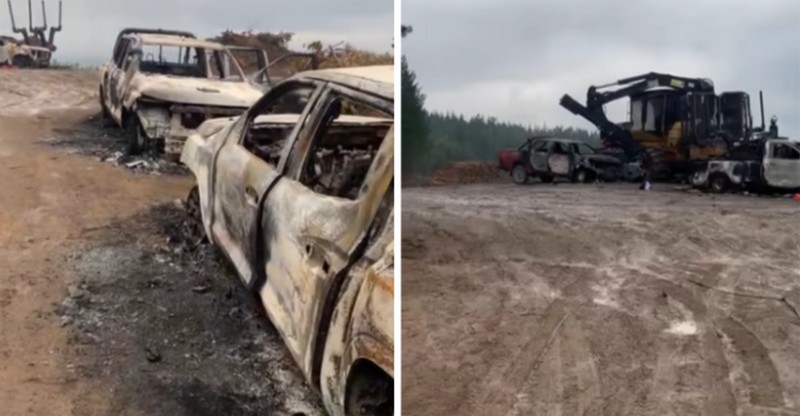Forest Crisis in Chile: Chronicle of a Death Foretold
ByLuis Astorga Schneiders
Honorary Director of the Association of Forest Engineers for Native Forests (AIFBN)
Prominent voices from major forestry companies (CMPC and Arauco), along with trade organizations such as CORMA, the Contractors Association, Pymemad, the Chilean Biomass Association, and the College of Forest Engineers, have spoken out in various media outlets to highlight a severe forest crisis in Chile. This crisis is evidenced by the burning of forests and plantations, timber theft, land usurpation, insecurity in accessing certain areas, and a decline in planted areas.
These statements share three common elements:
- They focus solely on territories with plantations and forest monocultures, with no mention of native forests or xerophytic formations.
- The same territorial actors who bear significant responsibility offer no self-criticism.
- They are merely complaints without proposed solutions.
There may not be a "forest retreat" as claimed by the Minister of Agriculture, but the crisis is real and stems from unresolved issues spanning decades: the lack of Territorial Planning that allowed large companies to plant pines and eucalyptus at will; the refusal to constitutionally recognize Indigenous peoples; the "invasion" of plantations into ancestral lands, cultural sites, and sacred Mapuche territories; the forced emigration of small farmers surrounded by plantations; the use of chemicals in monocultures; the impact of monocultures on ravines and water supply for communities; wildfires in forest plantations; and the use of harsh repression to impose "order and peace" south of Biobío, among other factors.
The process could be titled "Chronicle of a Death Foretold" by García Márquez, as numerous articles and books since the mid-90s have predicted this crisis. Some of these include the works of Professor Claudio Donoso Zegers from the Universidad Austral de Chile; books by Fernando Pairicán, Martín Correa, and Pedro Cayuqueo; proposals by former Intendant and Senator Huenchumilla; and documents published by the Observatory of Indigenous Peoples' Rights, the TERRAM Foundation, and the Association of Forest Engineers for Native Forests (AIFBN).
All of them highlight the need for a change in the forestry model.
The current crisis is the result of inaction by the State and governments of both the left and the right. Initiatives like the Forest Policy Council and the Challenges Commission of the Future Congress, though they made interesting proposals, lack effective action and fail to consider territorial realities.
A new model is needed—a new way of doing things that involves all sector stakeholders, especially at the local level, addressing Territorial Planning and local issues with consensus-based proposals. Here, the role of municipalities is essential as local facilitators.
It is crucial to emerge from the crisis by addressing its root causes. Measures like a new Decree 701 or increased police presence will not solve the problem. They would merely be a small band-aid on a deep wound.
Source: El Desconcierto















